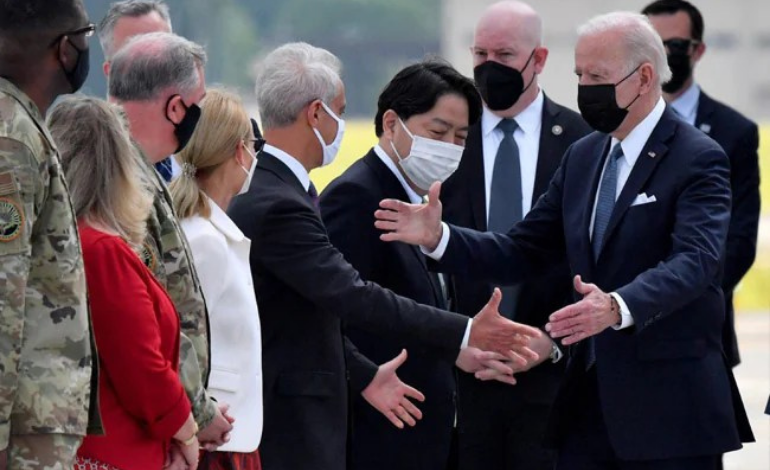Biden arrived in Japan on Monday after flying from South Korea to Yokota Air Base outside of Tokyo, where he will meet with Japanese Prime Minister Fumio Kishida and the emperor

President Joe Biden landed in Japan on Sunday for the second half of his Asia trip that emphasised the United States’ commitment to the area, but was overshadowed by fears that North Korea will test a nuclear weapon after disregarding Washington’s outreach efforts.
Biden, on his first trip to Asia as president, arrived at Yokota Air Base outside of Tokyo on Monday, where he will meet with Prime Minister Fumio Kishida and the Emperor, as well as reveal a US-led international trade plan.
He joins the presidents of Australia, India, and Japan for a Quad group summit on Tuesday, reinforcing the theme of American leadership in the Asia-Pacific.
The trip, which coincides with rival China’s economic disruption due to Covid outbreaks, has been hailed by Washington as a demonstration of the US desire to keep its commercial and military edge in the region.
But the danger that North Korea will launch a nuclear-capable missile or a bomb hangs over every step of Biden’s journey.
This was speculated to happen while Biden was only across the border in Seoul, but it did not happen. The threat, according to US National Security Advisor Jake Sullivan, is still present.
Sullivan said North Korea has an option, echoing Biden’s earlier statement that the US is “prepared for anything North Korea does.”
Before leaving for Japan on Sunday, Biden met with Hyundai’s chairman to celebrate the South Korean automaker’s decision to spend $5.5 billion in an electric vehicle plant in Georgia.
Along with Yoon, he visited with US and South Korean troops, a programme that a senior White House official suggested may “represent the really integrated nature” of the countries’ economic and military ties.
Biden also emphasises a larger, almost existential aspect of his trip, claiming that Asia is a critical battleground in the worldwide “fight between democracies and autocracies.”
“We discussed the importance of expanding this beyond the United States, Japan, and Korea to include the entire Pacific, the South Pacific, and the Indo-Pacific. This, I believe, is an opportunity “After meeting Yoon, Biden stated.
While China is the principal US adversary in this conflict, Biden highlighted the serious threat posed by Russia when he signed a $40 billion aid bill late Saturday to aid Ukraine in its fight against Russian forces.